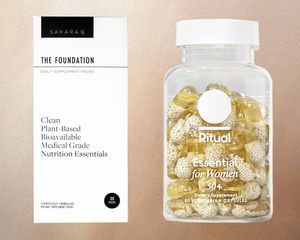:max_bytes(150000):strip_icc()/breadandcoffee-da6166fe915b4e129f8b377c0f313172.jpg)
Stocksy
Bulletproof Coffee is pretty popular these days, but the concept of preparing coffee with butter has been a regular practice in Himalayan and Indian cultures for centuries. Similarly, it's also common in Ayurveda to sip po cha, a traditional Tibetan drink made by churning fermented black tea with salty yak butter.
So why is the practice of adding butter to your morning brew still seeing the light of day? The claim, which was also purported centuries ago, is that replacing your breakfast with a combination of coffee, butter, and MCT oil will promote weight loss, keep you full, and boost mental clarity, among other benefits. And since the ready-to-make brand Bulletproof popped up in 2013, the notion is even more accessible.
Do the claims hold up? Though it may be fine to add to your diet, currently, there isn't enough research to definitively know if Bulletproof Coffee benefits the body in a positive way. We reached out to nutritionists Alix Turoff, Amanda Baker Lemein, and Maria Zamarripa to learn more about Bulletproof Coffee, including the pros and cons. Read on for what they had to say.
Meet the Expert
- Alix Turoff is a registered dietitian, certified personal trainer, and virtual nutrition coach. She is the author of Lose Your Belly Fat Cookbook.
- Amanda Baker Lemein is a Chicago-based registered dietitian. She has both clinical and counseling training, working with clients for a variety of nutrition needs including weight loss, emotional eating, prenatal nutrition, and adolescent health.
- Maria Zamarripa, RD, MS is a Denver-based dietitian who specializes in functional medicine and believes in using a wholesome, plant-rich diet as our natural "farmacy."
What Is Bulletproof Coffee?
Bulletproof Coffee is a trademarked butter coffee recipe (and brand) by entrepreneur and Bulletproof founder Dave Asprey. Making a cup of Bulletproof Coffee involves blending 1 cup of coffee brewed with Bulletproof ground coffee, unsalted grass-fed butter or ghee, and a Bulletproof-branded supplement called Brain Octane Oil, which is a medium-chain triglyceride (MCT) oil derived from coconut oil. The result is what the company calls “an energizing, high-performance drink” that’s meant to be consumed in place of breakfast.
Using Bulletproof’s recipe, your cup of coffee can range anywhere from 140 calories up to as high as 500 calories depending on how much Brain Octane Oil and butter you use, explains Turoff.
A true Bulletproof Coffee requires using Bulletproof-branded ingredients, but you can also make a similar butter coffee drink by combining other brands of coffee with grass-fed butter or ghee and MCT oil.
Is Bulletproof Coffee Bad For You?
Whether Bulletproof Coffee is a healthy choice will vary from person to person based on overall health and diet, nutritionists say. But there are a few points to consider, like Bulletproof’s high saturated fat content. “Overall, adding saturated fat to one's diet is not generally deemed healthy, as we want to limit our saturated fat intake and focus on unsaturated fats more,” says Lemein.
Butter adds a significant amount of calories to coffee, she says, and she also recommends people eat their calories rather than drinking them, as liquid calories don’t contribute to satiety in the same way as solids: “While adding butter to your coffee may make you feel fuller for longer, so will eating a balanced meal in the morning,” Lemein says.
Also of note: According to nutritionist Brooke Alpert, the concept of Bulletproof coffee promotes fasting in that it allows you to still consume something without actually breaking your fast in the morning. So while you may feel full, you're likely not getting the nutrients that a healthy meal would offer.
That said, grass-fed butter has its benefits. It’s a good source of vitamin A, which is important for keeping our immune system, eyes, and skin healthy, and it’s also high in a fatty acid called conjugated linoleic acid, which studies show may promote fat loss.
Saturated fat may not be as bad for us as we once thought, explains registered dietitian Maria Zamarripa, but some people still might see increased levels of harmful LDL cholesterol after increasing saturated fat intake by consuming Bulletproof Coffee every morning.
“One nutrient does not determine someone’s full health picture,” Zamarripa says. “We have to look at the diet as a whole, and while saturated fat isn’t unhealthy, most of our dietary fat intake should still be coming from unsaturated fats found in nuts, seeds, olive oil, and fatty fish.”
Benefits of MCT Oil
The Bulletproof website claims that the high-purity C8 medium-chain triglycerides (MCTs) in Brain Octane Oil travel directly to the liver where the body transforms them into chemicals called ketones that are burned for energy rather than “stored on your waistline.”
Zamarripa says MCT oil—which is often used in ketogenic diets to boost ketone production—may increase satiety and promote a small amount of weight loss. Some research found improvements in brain health among people with Alzheimer’s disease who took MCT oil, but further research is needed in this area. You'll also want to keep in mind that while MCT oil is generally safe, some people experience minor side effects like diarrhea, cramping, bloating, and an upset stomach after consuming it.
Lemein says MCT oil is in the spotlight right now because it’s more readily absorbed by the body than other fats, “meaning it's an easier energy source for those restricting other types of energy,” she explains—but it's still a saturated fat, so consuming large amounts of it is likely not ideal. Turoff says a lot of research needs to be done before we're able to gain a more definitive understanding of how MCT oil affects the body.
Is Drinking Bulletproof Coffee in Place of Breakfast Healthy?
The nutritionists we spoke with agree that eating a balanced breakfast is a more nutritious way to start your day than drinking Bulletproof Coffee, which can lead you to miss out on important nutrients like fiber, vitamins, and minerals. “While not necessarily unhealthy, I can name hundreds of things that would make a better breakfast,” Turoff says.
There’s a chance Bulletproof Coffee may leave you feeling fuller for longer, especially if you normally rely on a sugary breakfast, but “nutrition is much more complex than simply adding more saturated fat to one's drink and calling it healthy,” Lemein says. “There still needs to be a balance of all macronutrients—carbs, fat and protein—in one's diet.”
Is Bulletproof Coffee Healthier Than Other Types of Butter Coffee?
The verdict is still out on whether butter coffee has the same nutritional effects as Bulletproof Coffee. Zamarripa points out that Bulletproof encourages the use of grass-fed butter, which she says is higher in omega-3 fatty acids than conventional butter. Omega-3 fatty acids have been associated with benefits like lowering inflammation in the body. Grass-fed butter also contains vitamin K2, which is important for heart and bone health.
“From what I can tell, they have high standards for sourcing, which could be good,” Lemein says. “But ultimately, one's nutritional outcome for consuming or not consuming Bulletproof Coffee is going to come down to their overall daily intake of nutrients and how Bulletproof Coffee is balanced out with the rest of their diet.”
The Final Takeaway
Bulletproof Coffee may be fine to incorporate into your diet, but you’ll need to consider what else you’re eating, and keep in mind that there really isn’t enough research at this point to definitively know if Bulletproof Coffee benefits the body in a positive way.
Bulletproof may keep you full for longer than some other breakfast options, but, as we mentioned, nutritionists say you’re probably better off eating a balanced breakfast. For now you may want to consider swapping a mug of Bulletproof for a bowl of oatmeal and fruit with a side of some trusty espresso or drip coffee… at least until more research is available.



